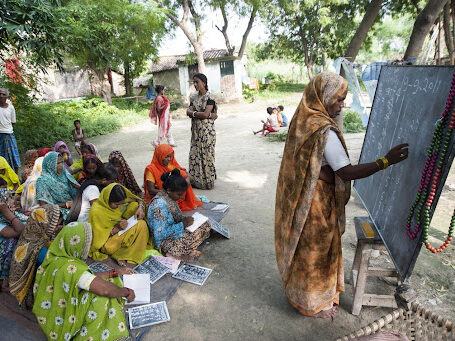Love and Literacy Bring an End to Generational Poverty
Nama grew up in a very poor community that worshiped stones, rivers, and trees. Because of her parents’ poverty and illiteracy, they didn’t send her to school. Instead, she worked in the fields to help support the family.
Nama was married as a child, and soon she had three children of her own. She again worked in the fields to help support her growing family. Sadly, Nama was addicted to alcohol and tobacco—if they didn’t have any money, she would sell things in their home to support her habits.
One day, a nonprofit organization started a literacy class in Nama’s village, and she eagerly began to learn. Soon, she could read and write! The love and respect the teachers showed to Nama gave her a sense of dignity. Something she had never felt. This gave her the resolve to be free from alcohol and tobacco abuse.
Education has given her an income she never imagined she could have. She had enough to send her children to school. Now the cycle of poverty, child labor, and child marriage has been broken in her generation!
The Heroes Behind the Story
Meet Maira. One day she heard that a literacy organization had come to town to offer classes. They were looking for educated volunteers. Maira stepped forward, and her application was approved! In a short time, she was trained to successfully lead a literacy class.
Maira and her assistant taught her students to read, write, and do basic math. Local business owners also taught the students how to run their own home-based businesses. Her trainer continued to visit Maira’s class throughout the school year to provide support and assistance. By the end of the year, families of the literacy students saw an average 55% increase in incomes, lifting most above the poverty level, and reducing the pressure to traffic students and their children. Nama was one of those students, and she’s now living in freedom and flourishing.
The Difference Makers
Problems like poverty, trafficking, and even infanticide seem so intractable because it’s all been around for so long. Why do millions in Nama’s country languish in generational poverty and slavery? Maybe it’s just indifference. It could also be tied to a person’s religious views. They assume that sort of life is all they can ever expect. Others agree with them.
Then a disruptor arrives in the form of caring people who offer a literacy class to impoverished and abused women. It’s not that the literacy class is all that it takes. It takes people who show love and dignity to women who have never experienced these things before. Love, dignity, self-worth coupled with a literacy class can transforms a person’s self-image in powerful ways. Then change they thought was never possible begins to happen. And with that change unjust cultural practices end, and people begin to flourish.
By God’s grace, ending generational poverty isn’t so hard after all!
About the Author
Elizabeth Stewart is the CEO of a nonprofit organization dedicated to seeing generational poverty and unjust cultural practices end by empowering women to find dignity and hope through education and self-worth. Pseudonyms have been used in this article.

